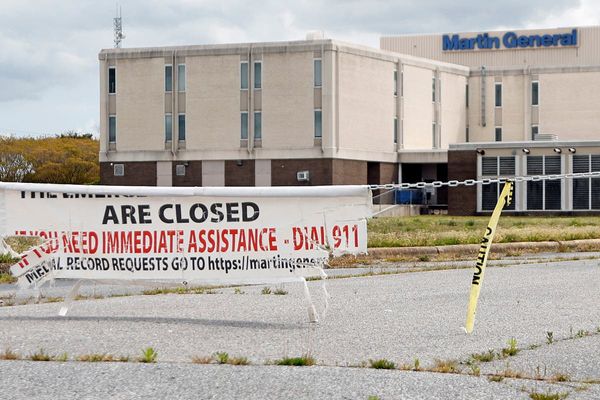
‘There’s a level of expectation that the world fits around the kids, the kids don’t fit around the world,” says Stephen “Boydie” Boyd, 49. He is the owner-manager of the Alma, a pub in Crystal Palace, south London, that does not admit children under 10. It’s a summer afternoon and most of the punters appear to be young adults and parents in their 50s, plus some teenagers with gen X parents.
Boyd’s observation strikes me as true at a cultural level even deeper than the pub: the problem with kids isn’t the kids; it’s the parents. Or rather, it’s what some parents become when their kids are under 10, gripped by a sense that the burden of keeping them contented is astronomically heavy and should be shared by all.
Martin Bridge, 52, the owner of the Whippet Inn, a boutique, child-free restaurant in York, says: “Being in the industry 30-odd years – and also out shopping, out in public places – how parents view the responsibility of their children, and how that has changed, is quite mind-blowing. It feels as though the kids are now the responsibility of everybody, all the time.”
Boyd continues: “None of the demands were particularly outrageous, but the sheer volume …” Apple juice with water in it; babyccinos; heat this up, but not too much; remove the mushrooms, the onions, the salt, the pepper. Then there was the glaring: at people who swear, vape or give any other indication that they are an adult in a pub.

For me, the peerless example of parental entitlement occurred 10 years ago, in an online comment underneath a restaurant review by the food critic Marina O’Loughlin: “The busier it got, the more the staff seemed to get annoyed with my child being there ... refusing to keep an eye on him for only two minutes while we went outside for a cigarette,” the aggrieved mother wrote. “My son was getting agitated, crying etc ... so I began to breastfeed him. The manageress came back with our brandies and just looked at me, disgusted ... This basically turned into a stand-up argument between me and this woman who is obviously jealous for some reason ... The food is nice but the misogyny is another story altogether.”
When it comes to questions of children in society, there is no consensus about what parents can or should expect from others. We could probably all agree that landlords cannot ban children in rental agreements, yet a BBC investigation this month found that almost a quarter of ads on OpenRent did so explicitly. It’s almost certainly a breach of the Equality Act, but tenants may never know why their application has been refused. Conversely, we could probably all agree that it’s not a waiter’s job to look after your baby while you go for a fag. Between these two points is a huge spectrum; wherever parents fall on it, they will most likely defend their position to the hilt.
The Whippet has been kid-free since it opened 10 years ago. Bridge remembers the initial response: “We got so many negative reviews it was unreal. People screaming and shouting at us in the restaurant. It was quite daunting, certainly for some of the staff. New parents were the worst.”
He got the feeling it wasn’t really about the restaurant: it had become an emblem to these parents of how their lives had changed, how their freedom and agency had been curtailed. I am paraphrasing, because he picks his words so carefully. New parents are scary.
When I was a kid, it was routine to bar children from pubs. I remember my dad walking my sister and me what felt like 10 miles (it was probably three), through heavy snow, to a pub, then having to sit outside with a lemonade and a packet of salt-and-vinegar crisps for hours. I thought maybe it was just my dad, but Bridge has exactly the same memory, down to the crisp flavour: “We used to get left in the car with the window down and a packet of salt-and-vinegar crisps. Your parents would look at you through the window to check you were all right.”
That wasn’t entirely parental negligence: it was against the law to let under-14s into pubs in England and Wales until 1995. When that changed, in the teeth of significant moral opposition, it was pushed through not as a parental rights issue, but with a vibe of: wouldn’t it be nicer if we were more like mainland Europe?
By the 21st century, however, the vogue had flipped, to the extent that it was unusual for a pub not to have a children’s menu. By 2010, when my kids were three and one, pubs were experimenting with playrooms, to get the smalls out of the main drag; there would be one cranky parent from every group, in a room full of Duplo and lidless felt tips, supervising mayhem with the onset of an unjust hangover.
Recently, though, some parts of the world have had enough. South Korea has 451 no-kid zones, which are scattered throughout Seoul and have spread to tourist areas such as Busan and Jeju island. These are thought to have taken off after an incident when a mother complained that her child had been scalded by a waitress carrying hot soup. The subsequent outrage prompted the restaurant to release CCTV footage, which showed the kid behaving like a hellion; in 2013, a court determined that the child had been partly responsible.
Here began a new battle that spiralled into campaigns, pronouncements and lawmaking (Jeju is working on a ban on banning children). The National Human Rights Commission of Korea decreed in 2017 that children’s rights should be respected and that they take priority over the freedom of owners to operate their businesses; it didn’t make a whole heap of difference.
South Korea has one of the lowest birthrates in the world, but the reason is foggy. Is it because people don’t want to have babies if they can’t take them to burger joints? Or has the relative scarcity of babies made people less tolerant of them carrying on in public? Emilie Cole, a spokesperson for the child-free Fistral Beach Hotel in Newquay, says: “In the end, you know what you’re getting: adults are adults, all children are different.” Did restaurants used to be better at tolerating difference? Or did parents used to be better at stamping it out?
In other countries, the examples come singly – a coffee house in Ireland; a spaghetti joint in New Jersey; a restaurant named, ironically, Grandma’s Kitchen in Germany, which has banned under-14s.
We have heard of these establishments not because they are numerous but because they generate the most furious, overwrought debate. Is this a misogynistic throwback, banishing mothers to domesticity? What is wrong with a society that can’t cope with its own young? Whither the future? The central question is probably held in common with all intractable arguments: who is being selfish and antisocial? The parents of small children, who want everything bent to their needs, or everyone else who doesn’t want to bend? We are all antisocial sometimes, but very few of us are all the time. It depends what kind of night’s sleep we’ve had.
Boyd first banned under-18s when he reopened the Alma post-Covid and couldn’t see a way to enforce the rule-of-six and social distancing with kids running around. His daughter later persuaded him to reduce the age limit to 10, on the basis that year 6s at school didn’t run around causing havoc and were generally able to sit still and finish their lunch.
“The biggest change is that our average spend has nearly doubled,” he says. The atmosphere is more relaxing, nobody is wedged in behind a buggy, people stay longer. They have cheese, another bottle of wine, perhaps. “They go up the wine menu. Parents are never going up the wine menu.” Staff turnover is way down because it’s a less hectic environment; previously, bar staff used to try to avoid the day shift. Edie Denvir, 28, has worked at the Alma for 18 months, and talks in very forgiving terms about the hordes of kids at the last place she worked – “I wouldn’t want to generalise, a lot of parents are really nice” – but the higher table spend obviously means better tips.

In the garden, Steven Penketh is enjoying a drink with his wife, Emma, and three teenagers, Molly, 19, Kit, 17, and Blake, 15. “Generally, people are quite aware of what their kids are up to, so I’m not in favour of banning children,” Emma says. They live locally and have been coming in for years, but still find it “a bit hostile”, Steven says, the way it’s the first thing the staff say when they take a booking over the phone: no under-10s. “I feel like saying, ‘What do you take me for, one of those morons who gives birth to a child before it’s 11?’”
However, he comes in anyway, “because I don’t come to the pub to enjoy other people’s children under 10”. Molly interjects with some detail about her parents: “They really like it in here. One of the waiters knows their names.”

Two tables away, Lawrence and Samsara, 24, are looking at the menu. I ask him about the kid-free policy and, affronted, he says: “But I’m 25!” Once we’ve cleared that up, he says he likes it anywhere he is allowed to smoke. “I don’t really, when there are kids around. I feel awkward.”
Perhaps the fiercest version of this row is played out not between parents and non-parents, but between sets of parents who are either at different points on the rearing curve or have very different attitudes about what “well-behaved” means, and whose responsibility it is to mind the baby while you smoke. When Mumsnet users have this debate, you can really hear how much people freight their parenting decisions with their own identity and self-fashioning. So the “Why can’t we be more like Italy, where everyone loves babies, and why shouldn’t children learn to love fine dining at a young age?” crowd are essentially flagging their own sophistication, while the “No three-year-old can be expected to behave properly in a pub/ I’ve paid good money for the luxury of not hearing any screaming” crowd are the voices of order and discipline – and these two camps will never see eye to eye. Ultimately, the pro-kids side is probably outnumbered by the legion who like children in principle, but feel they have done their time at the coalface. The day the Alma really worried about in the first year they went child-free was Mother’s Day. “It was by a country mile our busiest ever,” Boyd says.
Perhaps a selective child ban will pan out like the smoking ban: fiercely opposed in the run-up by stakeholders (smokers), but then when it had all shaken down, everyone, even smokers, realised how much nicer it was without the smell of other people’s encumbrances. Incidentally, calling the under-10s “encumbrances” is fine – once they are over 10, that’s what they call us.






